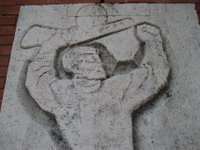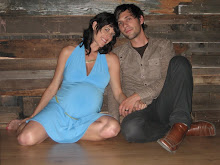
When you live in a city, it’s hard to find a quiet place that’s devoid of people. In my neighborhood, you’ve got two options: the cemetery, or the polling place on Election Day.
If it’s not the first Tuesday in November, then the cemetery is where you want to be. It’s the perfect place to bring your girl for a picnic or to hang out and read a book. It’s got green grass, trees, bay views, and dead bodies. It’s romantic in the way that the civil war is romantic; it’s full of stories concerning uncompromised beliefs, families torn apart, glorious death, and men doing shots of whiskey while riding lawnmowers.
When I go to the cemetery, I’m usually surrounded by its residents, or hunched, white-haired, soon-to-be residents. Lately, though, I’ve been noticing a lot of outsiders. By that I mean “the living” who aren’t me or my girl. There’s the random group of goth kids who hang out and smoke clove cigarettes. They’re stereotypical and adorable. (I only wish that they’d mix the white face paint with some wrinkle goo for a more honest representation of death.) There’s the “fleet” of midlife crisis remote control plane operators who yell at each other when one of them breaks formation and “jeopardizes the mission”. These guys are annoying like a metal detector guy, but with an added overhead buzz. There are the notebook toting history buffs who try to dissect the lives of the residents by looking at gravestones. How would you like it if some corpse came to your house and tried to sum up your life by looking at the mailbox? (Another late mortgage payment. Another blow up doll.)
And then there’s the bagpipe guy. He started showing up a few months ago, practicing his discordant bagpipery for hours on end. He’s totally mocking the dead. Everyone knows that the delicate tissue of the lungs decomposes quickly, and the dead are sensitive about this loss. This guy doesn’t care. He throws it in their faces. He fills his powerful lungs with air and blows into a contraption that even looks lung-ish. It’s as cruel as playing Marco Polo with deaf kids. Hey douchebag-piper, take up the xylophone.
I guess my real issue with these visitors stems from my guilt at, once again, being part of the gentrification process. This situation feels all too familiar, except for the fact that this time it's taking place in a cemetary. When I first started coming here, I was one of only a handful of “the living”. It was a rough time to be in the cemetery. Corpses would roll up on me with that cocky rigor mortis swagger and yell, ”You wanna fuck wit me? Huh? Wanna go? I got no nerve endings, bitch!” Over time, I won their respect, and we learned to get along fine.
But now all the other living people see me kickin it out here and they think it’s cool. There are dudes from the suburbs coming in acting all tough, saying, “I’m OLD school skeleton like Lucy and shit.” These fools play at being dead just because it’s trendy. They don’t care about the dead as individuals, or what they’re like on the inside. (maggoty)
Next there will be cafes, art galleries, expensive restaurants, and baby strollers everywhere. Eventually, my neighbors will lose their cheap residences and begin to resent me. Then, just like what happened in Brooklyn and West Oakland, they will chase me down and try to eat my brains.
You can call me paranoid, but I’ve seen this process play out many times. The cemetery on the other side of town is so gentrified that everyone looks and dresses exactly the same. In that cemetery, there’s only one way to tell the living from the dead. The dead are still on Friendster.



